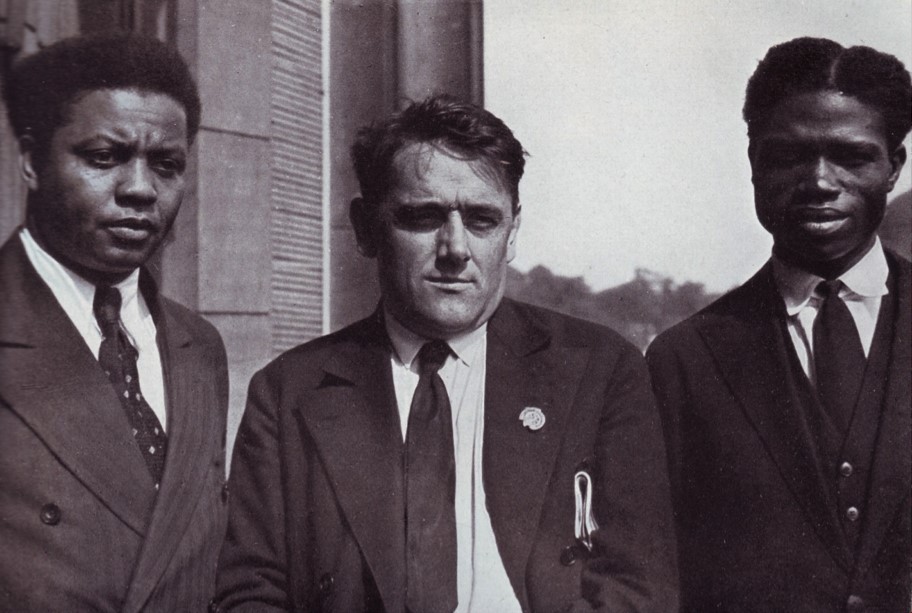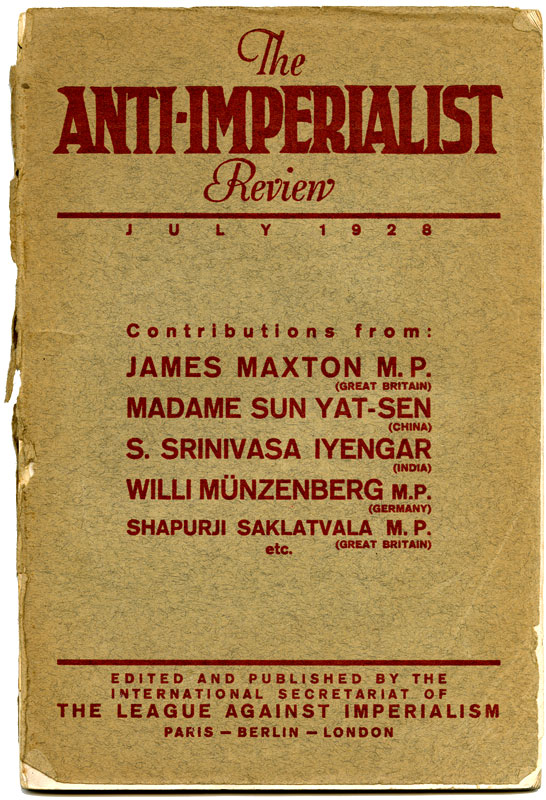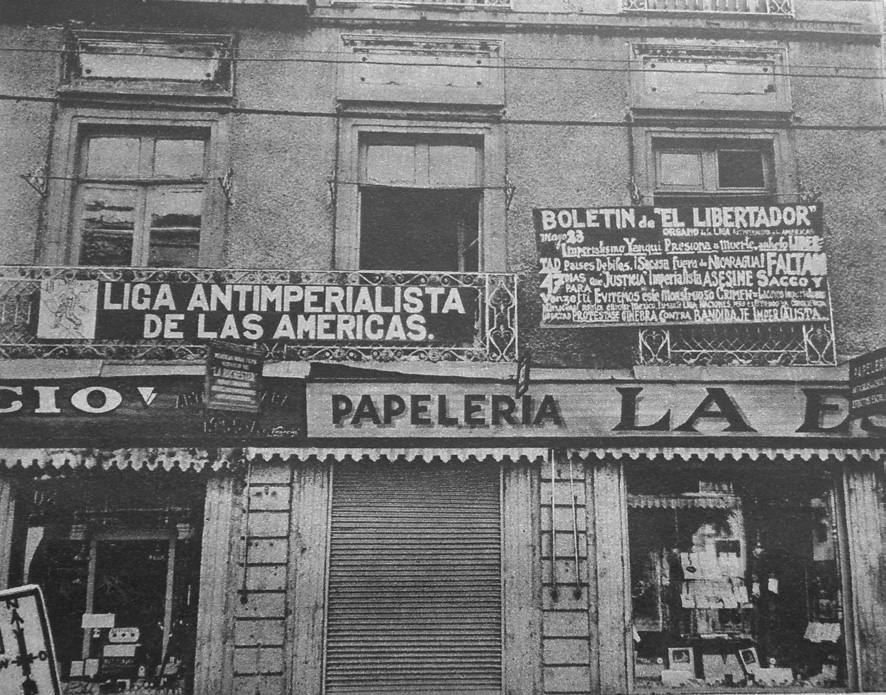
Two years after its founding and a vastly different, but still significant, second international Congress of the League Against Imperialism took place in Frankfurt am Main in the summer of 1929. Between the two congresses the alliance with the Kuomintang had been drowned in blood, a significant change in leadership and policy the Soviet Union and Communist International occurred as the New Economic Policy gave way to the Third Period, the growth of the Independent Labour Party in Britain, and the withdrawal of the Indian National Congress from active League participation. Willi Münzenberg reports.
‘The Frankfort Congress of the League Against Imperialism’ by Willi Münzenberg from International Press Correspondence. Vol. 9 No. 38. August 9, 1929.
The Second World Congress of the League against Imperialism in Frankfort on Main reflected the development of the national-revolutionary movement during the past few years. The right-wing groups of the national bourgeoisie in most countries have made their peace with imperialism, have allied themselves with imperialism and are now organising a joint exploitation of the workers and peasants. In Brussels a number of these groups were still represented, but at Frankfort none of them was there.
The Kuomintang in China is characteristic of the development of these sections of the national bourgeoisie in the countries oppressed by imperialism. In alliance with the British, French and American imperialists the Kuomintang has not only crushed the revolutionary workers and peasants movement in China and choked it in blood, but today it is also striving to kindle a conflagration against the Soviet Union. In India the right wing of the national bourgeoisie, at this year’s session of the Indian
National Congress abandoned the demand for the complete independence of India, a demand which the Brussels congress of the League against Imperialism also adopted at the direct proposal of the representative of the Indian National Congress, and adopted a miserable compromise of Ghandi. In the Latin American countries Calles and his friends who posed as being very revolutionary in 1927, have since made their peace with Wall Street and have become obedient servants of North American imperialism.
The congress in Frankfort expressed this development of the leading sections of the national bourgeoisie in the oppressed countries with all possible sharpness, and at the same time it exposed the counter-revolutionary role which these groups are playing today in the struggle for national and social freedom.
The congress went still further, it pointed to the dangers which exist with regard to those vacillating elements which consist partly of groups of the national bourgeoisie and partly of petty-bourgeois groups, grouped around Mme. Sun Yat-sen, Eugen Tchen and Janda Deng in China, and in India around the leaders of the left-wing of the Indian National Congress and around the leaders of the Indian Trades Union Congress. In its reports, its manifesto and its theses concerning the situation in China, India, Latin America and Indonesia, the congress pointed out with all possible clarity that a real and serious revolutionary movement, capable of driving out the foreign imperialists and overthrowing native capitalism, could only be based upon the million masses of the workers and peasants.
One of the great successes of the Frankfort congress, which marked considerable progress as compared with Brussels, was that not only were the imperialist right-wing groups of the national bourgeoisie not present, but that the representatives of the workers and peasants organisations were present to a far greater degree than before. From the Philippines, from China, from Latin-America, from Arabia, from North Africa etc., there were almost solely representatives of proletarian organisations, of trade unions, workers and peasants organisations, Communist Parties etc. present. It was the characteristic feature of the Frankfort congress that the majority of the delegates were from workers and peasants organisations, whereas at the Brussels congress the intellectual groups still greatly predominated.
The Frankfort congress also answered the pro-imperialist policy of the Second International which caused the latter to adopt a decision against the League Against Imperialism at the International congress of the L.S.I. in Brussels in 1928. It is clear that an organisation in which such people as the imperialist and capitalist ministers MacDonald, the Prime Minister of Great Britain, Henderson, His Majesty’s Secretary of State for Foreign Affairs, who are continuing Chamberlain’s policy of oppression and exploitation in India and in the other colonial countries against the colonial peoples, Hermann Mueller, Severing and their friends, the former Belgian Minister Vandervelde, cannot conduct an anti-imperialist policy, that it can conduct only an imperialist and capitalist policy. The declarations and speeches of hundreds of colonial delegates at the Frankfort congress brought this fact once again to the attention of public opinion and of the proletariat all over the world. The severe criticism directed against the Second International did not spare the so-called left-wing of the socialist parties, like the Independent Labour Party in Great Britain. The congress was compelled to record the fact that the policy of the Independent Labour Party, which in words is an anti-imperialist policy, is in fact a support of the imperialist policy of MacDonald etc. The parliamentary Labour Party and the fate of the Labour government depends considerably upon the attitude of the I.L.P. fraction. The criticism directed against the Labour Party of course hit James Maxton also, the chairman of the I.L.P. and the chairman of the League Against Imperialism. Challenged by the plain questions of the representative of the Soviet labour unions, Melnichansky, Maxton made a long declaration in Friday’s session of the congress condemning not only the policy of the MacDonald government and of the Labour Party, but also the policy of the majority of the Independent Labour Party. The future must show how far Maxton’s promise to conduct a decisive struggle against the imperialist policy of the Labour Party and of the Independent Labour Party will be fulfilled.
The discussion between the communist section of the congress and the Maxton group, which was intensified in the commissions and to some extent in the congress itself by the participation of anti-militarist groups, representatives of national-revolutionary organisations and intellectuals, gave the so-called great press the opportunity of speaking of a threatening split in the League and of the threatening break up of the congress. On Thursday a Frankfort newspaper reported that the British delegation was leaving. The hopes of the capitalist and social democratic newspapers that a split would take place and that considerable sections would split away from the League have happily not been fulfilled. The League against Imperialism stood its acid test at Frankfort. It has rejected the reactionary groups of the national bourgeoisie which pursue a capitalist policy jointly with the imperialists and commenced an intensified struggle against them through the Frankfort congress.
At the Frankfort congress the League Against Imperialism made all the necessary preparations for the fulfilment of its historical task of forming a fighting alliance between the national-revolutionary wing of the petty-bourgeois and peasant strata with the broad masses of the international proletariat. In various countries of international political importance, such as Indonesia, Arabia, Syria, Northern Africa, Latin America etc., there are still national-revolutionary organisations which are conducting a serious struggle for national freedom.
The great political success of the Frankfort congress was the fact that it completely united just these groups and organisations and strengthened the alliance with the representatives of the European and non-European working class and peasant organisations who were present at the congress. In comparison with the Brussels congress, the Frankfort congress represents a considerable move to the Left. The main weight of the League against Imperialism no longer rests on liberal and intellectual men and women as individuals, as it did at the time of its formation, but upon the broad masses of the workers and peasants affiliated to the League in the oppressed countries. That this development was made and this result achieved with the unanimous approval of everyone at the congress, anarchists, syndicalists, anti-militarists, socialists, communists and social revolutionaries, is a success upon which the League against Imperialism may pride itself, which causes profound chagrin to all our enemies and which is received by all our friends with pleasure and satisfaction.
International Press Correspondence, widely known as”Inprecorr” was published by the Executive Committee of the Communist International (ECCI) regularly in German and English, occasionally in many other languages, beginning in 1921 and lasting in English until 1938. Inprecorr’s role was to supply translated articles to the English-speaking press of the International from the Comintern’s different sections, as well as news and statements from the ECCI. Many ‘Daily Worker’ and ‘Communist’ articles originated in Inprecorr, and it also published articles by American comrades for use in other countries. It was published at least weekly, and often thrice weekly.
PDF of full issue: https://www.marxists.org/history/international/comintern/inprecor/1929/v09n38-aug-09-1929-Inprecor-op.pdf

